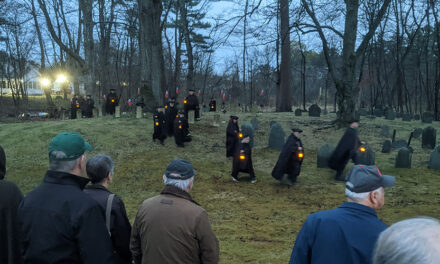By MAUREEN DOHERTY
LYNNFIELD — Police Chief Dave Breen has proposed a budget totaling $2,856,608 for FY’16, an overall increase of 9.1 percent over the current fiscal year budget of $2.62 million.
The majority of the increase comes from salaries due to changes in the make up of the force resulting from a retirement and a promotion that expanded the number of sergeants from four to five, plus the addition of two new officers to meet growing demands in town. The department will increase its patrol force from 13 officers to 15.
In addition to salaries, at about $48,000 apiece for a rookie, costs associated with the future new hires include training and outfitting them with uniforms and gear, plus police academy expenses unless they’re transferring from another department, Breen said.
The total of “other police salaries” will rise by 7.2 percent, to $1,987,436, up from $1,853,384 in FY’15. The majority of this line item comes from salaries for patrolmen, which is proposed to increase by 11.3 percent to $1,355,833 in FY’16, up from $1,217,781 in the current fiscal year.
Also included in this budget are the salaries for dispatchers ($213,089), police matrons ($5,000), clerical ($59,394), traffic ($29,671) and other expenses such as longevity, holiday pay and school credit, which actually decreased by 3.4 percent to $198,591.
The police chief’s salary will increase by two percent, to $169,087, the same across the board raise in pay all town employees will receive this year.
Training increase 155%
Money for regular overtime pay is proposed at $365,550. Overtime funds needed for officer training increased by 155 percent to $124,248, up from $48,600 allotted last year. While that is a significant increase, Breen explained training had been underfunded for a number of years so when this fund got tapped out they would draw from the overtime account.
“We are at minimum manning all the time, so when one officer goes to the training and elects to not work his shift we have to fill that on overtime. Either way we are going to pay the officer going to the training or the officer working for him,” Breen said.
“We have officers who need 40 hours of in-service training per year. Over the past few years the state did not fund the in-service training portion, so we did not offer it. We were performing some of that training in the station and some of it just did not occur,” he added.
The FY’16 budget he proposes represents fully funding the 40 hours per year each officers needs. They receive this training at the Northeast Regional Police Institute in Reading.
In addition to mandatory training, Breen said this fund will be used for “specialized required training and specialized training” for officers. For example, every officer on the force is a trained EMT so in addition to the 40 hours of minimum training, each officer must complete 40 hours of EMT training every other year. Breen has budgeted it at 20 hours per year.
He added that mandatory training is required on their pistols, rifles and shotguns during a 24 hour class held at an outdoor range in Manchester. Mandatory taser training and suicide prevention are also in the mix.
“It’s 100 hours (of training) per officer times 20,” Breen said.
Officers who want to specialize in particular areas can also opt for other available training, such as the officer who is a member of the NEMLAC SWAT team and Sgt. Nick Secatore’s training for the Regional Response Team, he said.
“The school resource officer, when we do finally fill that position, is a 40-hour class; the armorer is 16-hour class, criminal investigator is 60. Bicycle training is 24, motorcycle officer is 40 and truck enforcement is 16 hours,” Breen said. He also highly recommends professional development for supervisors, “which we currently do not do,”
Other police department expenses covering various necessities such as vehicle and radio maintenance, the phone system, supplies ranging from office equipment to ammunition has increased 9.8 percent over the last fiscal year, to $210,287.
“Your budget makes sense. Nothing here is unusual — two new officers, the promotions and the training,” said Selectman Phil Crawford. Chairman Dave Nelson said he also did not have any questions on the operating budget.
Selectman Tom Terranova agreed, adding that “the biggest part of the increase (in the police budget) is what the people wanted, which is more police officers.”
Capital budget
Breen also proposed a capital expense budget for his department of $137,777. This includes two new cruisers with electronics for a Ford at $38,760 and a Chevrolet 4WD for the supervisors at $44,817.
The next largest capital expense is $27,500 for 11 VHF/UHF radios, chargers and batteries. He is also requesting four tasers ($6,600); two patrol rifles ($4,000); an audio-video recorder ($4,500); a video camera for the DPW garage ($2,500); an upgraded keyscan system ($3,500); two Panasonic toughbooks ($6,000) and three in-house Dell computers at $1,200 apiece.




